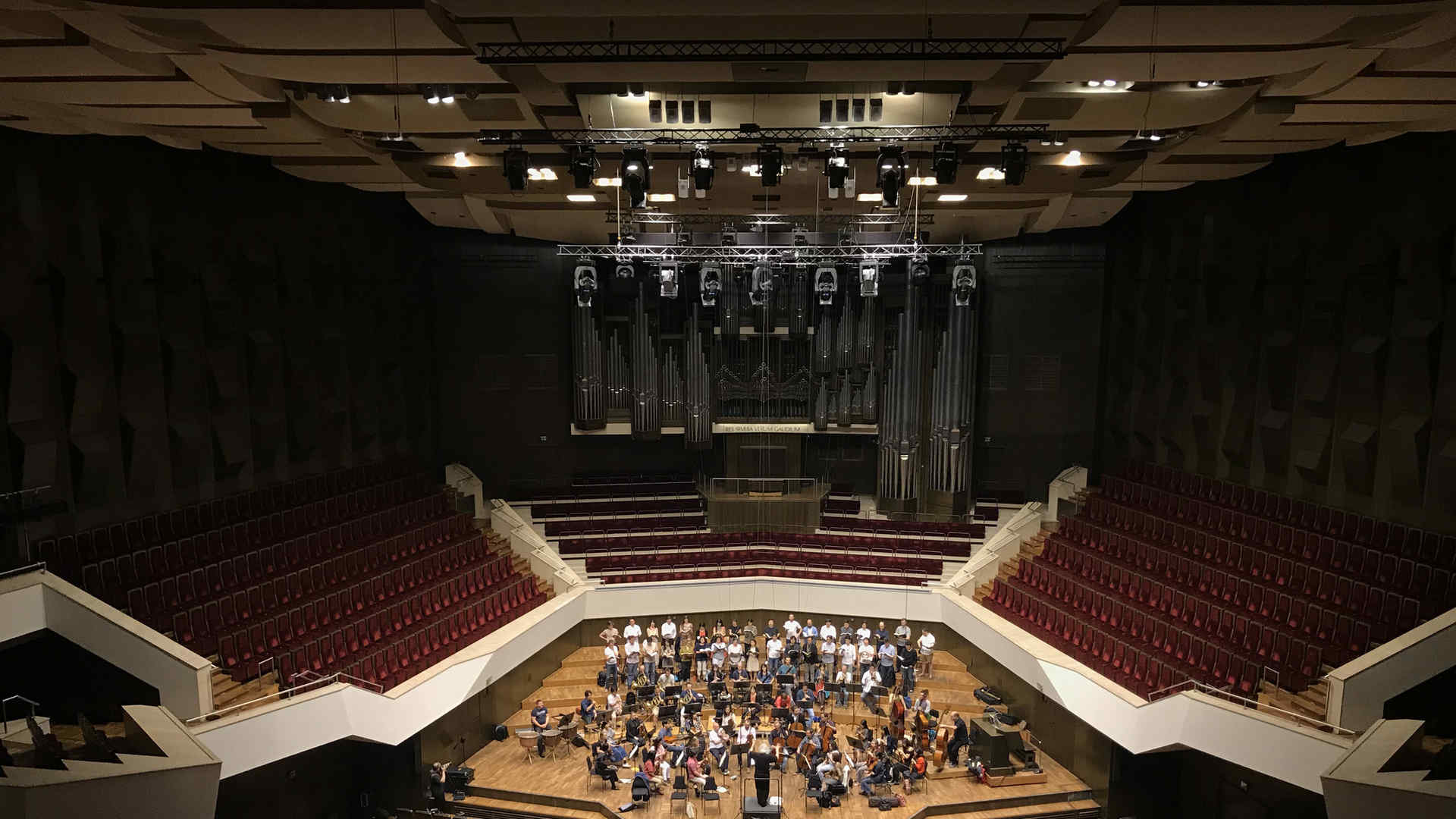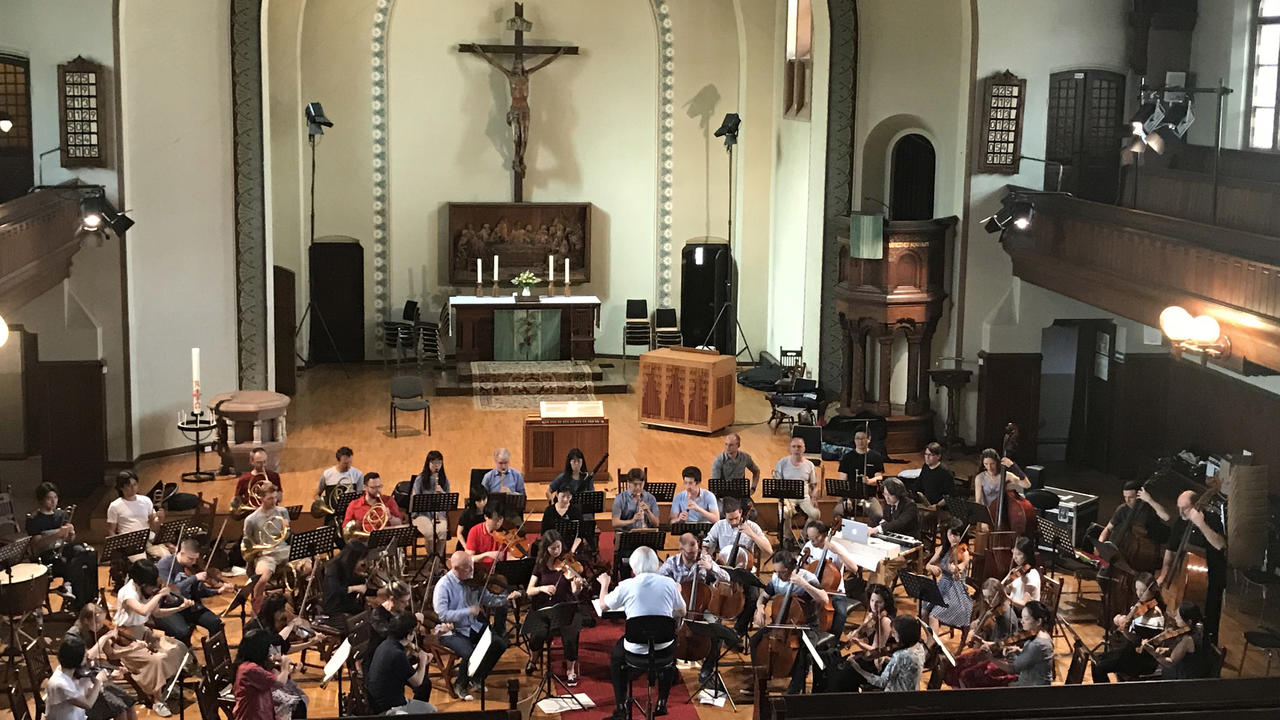
During Juilliard415’s tour of New Zealand last summer, our conductor, Masaaki Suzuki, said that his Bach Collegium Japan had been invited to BachFest Leipzig to give a period-instrument performance of Mendelssohn’s Elijah, and he asked whether this large-scale work might be a good opportunity for collaboration between BCJ and Juilliard415. Thanks to a few precious donors and the efforts of colleagues in Juilliard’s development department, this kernel of an idea reached fruition in June when 14 HP string players flew to Leipzig for this historic concert. It marked the first time a Juilliard student ensemble performed at the Leipzig Gewandhaus and Juilliard415’s second appearance in Leipzig. Benjamin Sosland emailed reports during the trip, which have been edited and condensed here.
The history of Western music is all around us in Leipzig, and I can think of no better place to bring students from Historical Performance on an extended field trip. Until you’ve heard a Bach cantata in the Thomaskirche, the church for which Bach wrote it and in which he directed it, your musical education is incomplete. You don’t realize how large the Thomaskirche is until you set foot inside—this is not the place for wimpy early music. For the concert we saw, more than 1,000 people packed the church, whose ceiling soars some 150 feet, as they do for every concert in the weeklong Bach Fest, which draws a huge influx of visitors from all over the world.
While we were in Leipzig to perform, our students were also able to take advantage of its extraordinary cultural offerings, including a private tour of the Bach Archive—the international treasure from which all Bach scholarship flows—led by its director, who was kind enough to put original manuscripts and performing parts of a few cantatas on view. Some students also visited the museum where Schiller lived and wrote “Ode to Joy,” the house where Robert and Clara Schumann lived, the Mendelssohns’ large and patrician apartment, now a museum displaying everything from Felix’s hairbrush to precious manuscripts. Mendelssohn was one of the celebrated music directors of the Gewandhaus Orchestra in the 1830s; a few hours after we visited the museum, we performed his Elijah there.
Mendelssohn is hardly the bread and butter of most HP students whose primary repertoire tends to skew a bit earlier, and you enter into these collaborations with a little trepidation since there is an element of risk in bringing such disparate forces together. But once our rehearsals began, goodwill and musical know-how prevailed and suddenly the quixotic notion of playing a major oratorio in one of the world’s greatest concert halls with essentially two-and-a-half days of rehearsal seemed totally within reach.

We had a large orchestra (for early music), with big string sections, four horns, three trombones, pairs of winds (including clarinets), and trumpets, along with four fabulous soloists and a chorus of 36. We even had an ophicleide, the tuba’s obsolete predecessor. (This was an international affair: Our string players augmented the BCJ string section, the wind players and vocal soloists were European, and the choir was mostly Japanese. And Elijah was sung in German!) But the truly unusual issue was the pitch of the performance. Because we were using the huge concert organ (played by Masaaki’s son, Masato) built in to the Gewandhaus, we had no choice but to adjust to its pitch, which was A=448! Stringed instruments can pretty much make the adjustment without too much trouble, and that extra tension makes for a really bright and penetrating sound. But the winds, especially the oboes and bassoons, had to invent all sorts of ways to accommodate. And it sounded good! Leaving nothing to chance, Masaaki requested that the Gewandhaus start cranking up the A/C as early as possible the morning of the concert. The dress rehearsal was freezing, but the temperature did bring the pitch of the organ down slightly, to A=446, by the time the performance rolled around that evening. The orchestra played pristinely in tune—and we got five curtain calls! The audience just wouldn’t let the performers leave the stage.
At the reception afterward, the recurring theme in our remarks was how this concert, led with such grace and generosity by Masaaki, brought together musicians from so many different parts of the world. There was never a moment of discord, and from the very first notes, it was a collective pleasure. And that was not a given. Elijah is almost never done with period instruments. Orchestras with so many pick-up members don’t necessarily gel. And fielding an orchestra of the size and expertise (the horn parts are killer on natural horn) to conquer this very challenging music doesn’t come along all that often, if ever. So it’s just nice to be reminded that some clichés are true. Music once again cast its magic spell, dissolving language and cultural barriers.
There’s only so much you can teach in a classroom or concert hall at Juilliard, and being able to open eyes to new places and possibilities, and knowing that they will never be the same, is a unique type of reward.
Benjamin D. Sosland (MM ’03, DMA ’08, voice) is the administrative director of Juilliard Historical Performance and assistant dean for the Kovner Fellowships